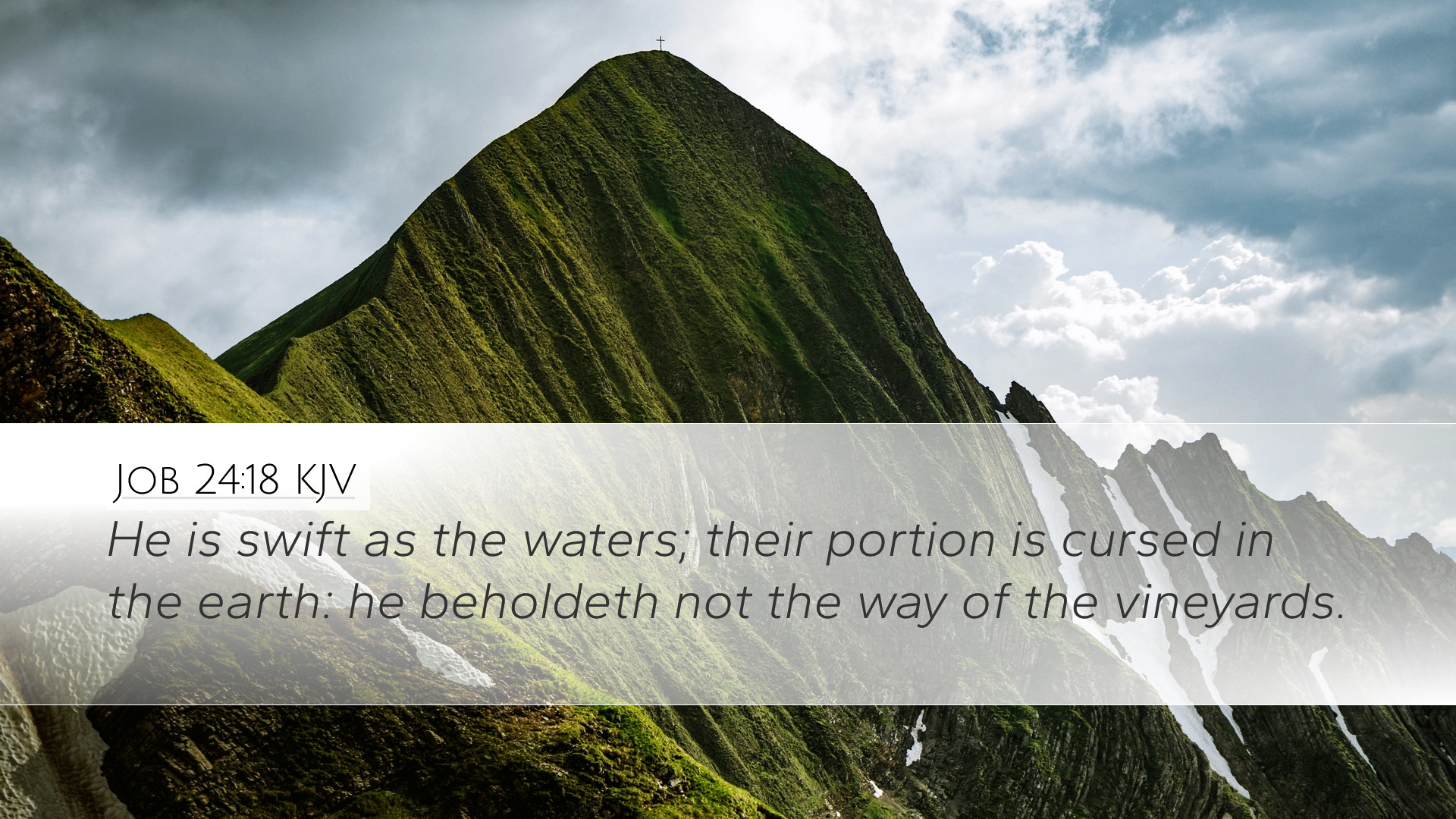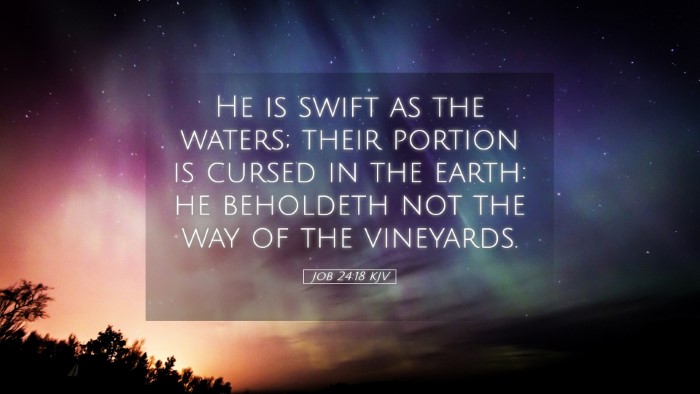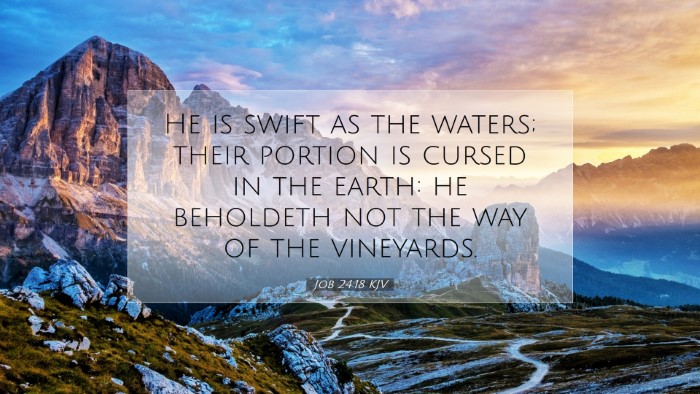Old Testament
Genesis Exodus Leviticus Numbers Deuteronomy Joshua Judges Ruth 1 Samuel 2 Samuel 1 Kings 2 Kings 1 Chronicles 2 Chronicles Ezra Nehemiah Esther Job Psalms Proverbs Ecclesiastes Song of Solomon Isaiah Jeremiah Lamentations Ezekiel Daniel Hosea Joel Amos Obadiah Jonah Micah Nahum Habakkuk Zephaniah Haggai Zechariah MalachiJob 24:18
Job 24:18 KJV
He is swift as the waters; their portion is cursed in the earth: he beholdeth not the way of the vineyards.
Job 24:18 Bible Commentary
Commentary on Job 24:18
Verse Context: Job 24:18 reads, "They are as stubble before the wind, and as chaff that the storm carrieth away." In the chapter, Job reflects on the seeming prosperity of the wicked and the afflictions of the righteous, raising profound questions about justice and divine oversight in the earthly realm.
Insights from Public Domain Commentaries
This verse is part of a longer discourse by Job that showcases his deep anguish and confusion over the prosperity of the wicked while the righteous suffer. We will explore various interpretations and insights from Matthew Henry, Albert Barnes, and Adam Clarke, aiming to provide a profound understanding suitable for pastors, students, and scholars.
Matthew Henry's Commentary
Overview: Matthew Henry emphasizes the fleeting nature of the wicked's prosperity in this verse. He draws a parallel between those who do evil and the stubble or chaff that offers no lasting substance.
- Transient Success: Henry points out that just as stubble and chaff are carried away by the wind, so too are the wicked's temporal gains.
- Judgment's Guarantee: He assures the reader that God's justice will ultimately prevail, as the lives of the wicked are like a temporary illusion.
- Nature of Wickedness: The metaphor implies that while the wicked may appear to thrive, their existence is devoid of permanence and vitality, much like the byproducts of harvest that are easily dismissed.
Albert Barnes' Commentary
Analysis of the Text: Albert Barnes reflects on the metaphor used in this verse, interpreting it as a vivid illustration of the fate of the wicked.
- Chaff's Meaning: Barnes explains that chaff refers to what is light, insubstantial, and worthless. It signifies the ultimate fate of those who oppose God.
- Destruction of Evil: He emphasizes that the description serves as a warning, highlighting the destructive outcome waiting for those who ignore divine law and justice.
- Suffering of the Righteous: Barnes contextualizes Job's lament, noting that the contrast between the temporary success of the wicked and the ongoing trials of the righteous reflects a deep-seated theological conundrum that many believers wrestle with.
Adam Clarke's Commentary
Exegesis and Interpretation: Adam Clarke offers an extensive examination of the linguistic and thematic dimensions of this text.
- Linguistic Analysis: Clarke delves into the Hebrew terms used, pointing out their meanings and implications. He explains that "stubble" and "chaff" evoke notions of worthlessness and are often associated with divine judgment.
- Philosophical Reflection: He engages in a philosophical inquiry about the nature of justice, pondering why the wicked seemingly prosper while the righteous endure suffering.
- Expectation of Justice: Clarke concludes with a call for faith in God’s ultimate justice, reinforcing that human understanding is limited, and God's ways are higher than our own.
Theological Implications
The insights gleaned from these commentaries highlight several theological implications regarding suffering, justice, and the nature of wickedness.
- Divine Justice: The verse encapsulates the tension between human perception of justice and God's sovereign plan. It assures the faithful that divine retribution is inevitable.
- Ephemeral Nature of Evil: The metaphor of stubble and chaff emphasizes that while evil may seem to flourish temporarily, it lacks the strength and stability that comes from righteousness.
- Encouragement for Believers: For ministers and scholars alike, this passage serves as a reminder to encourage congregants who suffer, helping them to trust in God's eventual justice and mercy.
Conclusion
Job 24:18 serves as a poignant reminder of the transient nature of wickedness in the eyes of God. The combined insights from Matthew Henry, Albert Barnes, and Adam Clarke provide a rich tapestry of understanding that speaks to the heart of the human experience—questioning the presence of evil in a world governed by a just God.
As pastors and theologians navigate the complexities of suffering and justice, this verse can inspire a deeper faith in God's providence and a commitment to fostering hope amidst human trials.


